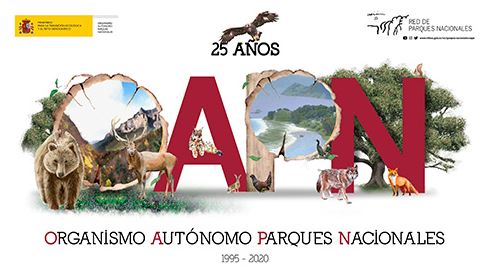Parques Nacionales de España

En el año 2016, el Organismo Autónomo Parques Nacionales celebró 100 años de la primera Ley de parques nacionales, publicada el 8 de diciembre de 1916. Con tal motivo, convocó un Concurso de Fotografía bajo el título 100 Años en la Red de Parques Nacionales: Los parques nacionales y sus gentes para promover, impulsar y valorar las aportaciones que los ciudadanos pudieran realizar con el fin de fomentar un mejor y mayor conocimiento de la extraordinaria riqueza natural y humana que alberga el conjunto de los 15 parques nacionales que configuran la actual Red.
Con esta exposición, en la que se presentan dos fotografías por Parque Nacional seleccionadas de entre las 150 finalistas del concurso, se ofrece una visión amplia y artística de la riqueza natural del territorio nacional. Una riqueza que viene protegiéndose desde hace ya más de 100 años y que constituye la muestra más representativa y conservada del singular patrimonio natural español. Un maravilloso legado a conocer, admirar y conservar, en beneficio de las generaciones presentes y venideras.
Características técnicas
| Exposición disponible para | Medio de transporte necesario |
|---|---|
 Préstamo Préstamo |
Furgoneta mediana |
| Peso | Volumen | Superficie mínima para el montaje |
|---|---|---|
| 200 kg aprox. | 1,5 m3 | Se recomienda una superficie no menor de 50 m lineales para poder espaciar los cuadros |
| Elementos | Dimensiones de los cuadros | Peso |
|---|---|---|
|
32 cuadros en cuatro cajas (no incluye los soportes para colgar) |
101 x 71 x 2 cm | 1,2 kg. aprox. cada uno |
| Destinatarios público en general |
|---|

-
Vista de la exposición (soportes no incluidos)
Parques Nacionales de España
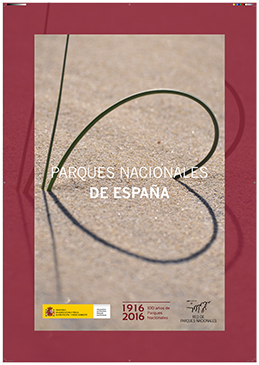 Portada de la exposición Parques Nacionales de España
Portada de la exposición Parques Nacionales de España
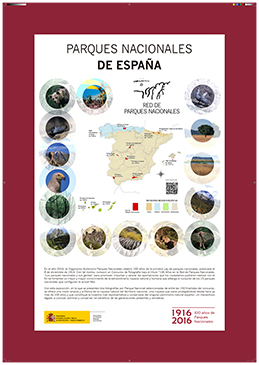 Presentación de la exposición Parques Nacionales de España
Presentación de la exposición Parques Nacionales de España
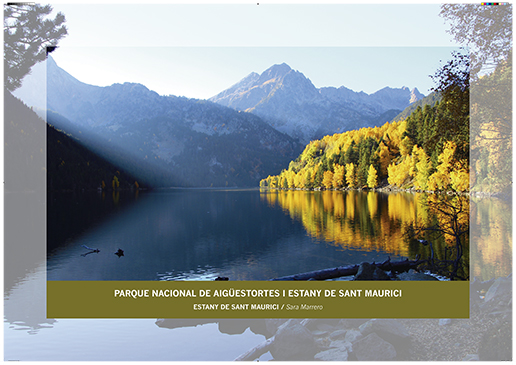 Aigüestortes i Estany de Sant Maurici. Estany de Sant Maurici / Sara Marrero
Aigüestortes i Estany de Sant Maurici. Estany de Sant Maurici / Sara Marrero
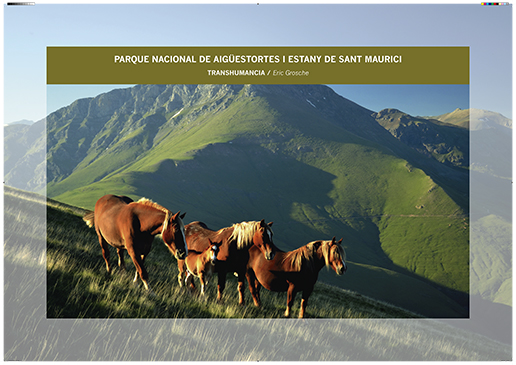 Aigüestortes i Estany de Sant Maurici. Trashumancia / Eric Grosche
Aigüestortes i Estany de Sant Maurici. Trashumancia / Eric Grosche
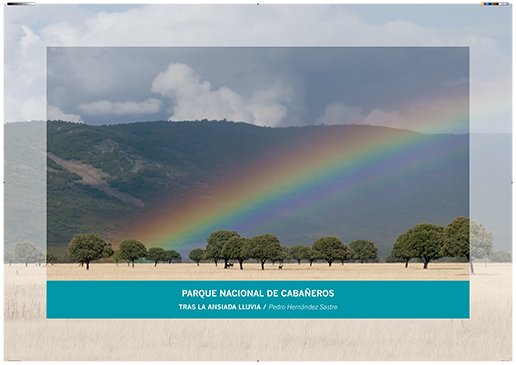 Cabañeros. Tras la ansiada lluvia / Pedro Hernández Sastre
Cabañeros. Tras la ansiada lluvia / Pedro Hernández Sastre
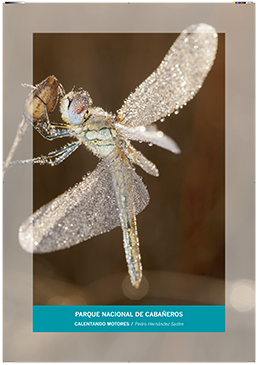 Cabañeros. Calentando motores / Pedro Hernández Sastre
Cabañeros. Calentando motores / Pedro Hernández Sastre
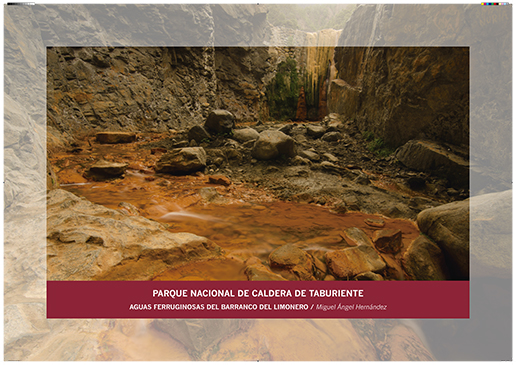 Caldera de Taburiente. Aguas ferruginosas del barranco del limonero / Miguel Ángel Hernández
Caldera de Taburiente. Aguas ferruginosas del barranco del limonero / Miguel Ángel Hernández
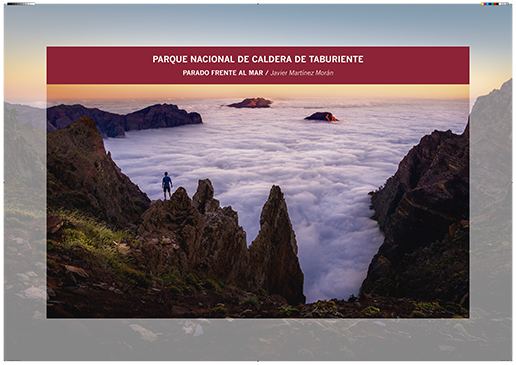 Caldera de Taburiente. Parado frente al mar / Javier Martínez Morán
Caldera de Taburiente. Parado frente al mar / Javier Martínez Morán
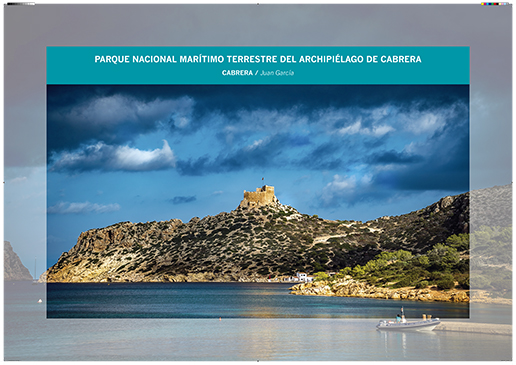 Archipiélago de Cabrera. Cabrera / Juan García
Archipiélago de Cabrera. Cabrera / Juan García
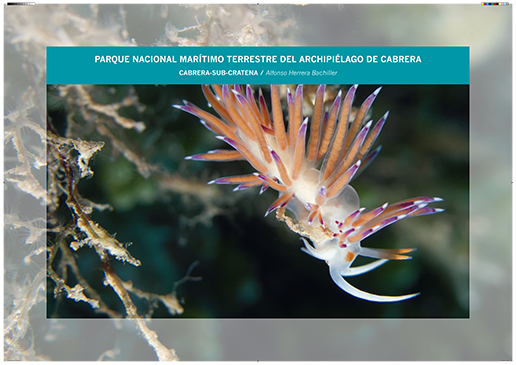 Archipiélago de Cabrera. Cabrera-sub-cratena / Alfonso Herrera Bachiller
Archipiélago de Cabrera. Cabrera-sub-cratena / Alfonso Herrera Bachiller
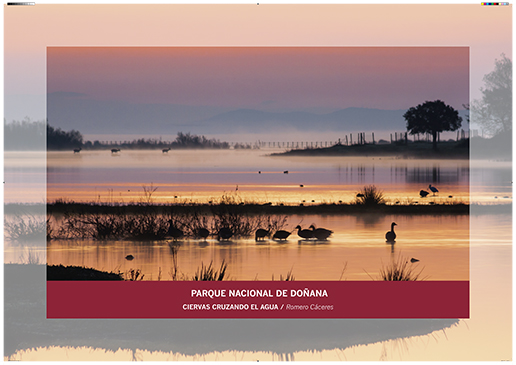 Doñana. Ciervas cruzando el agua / Romero Cáceres
Doñana. Ciervas cruzando el agua / Romero Cáceres
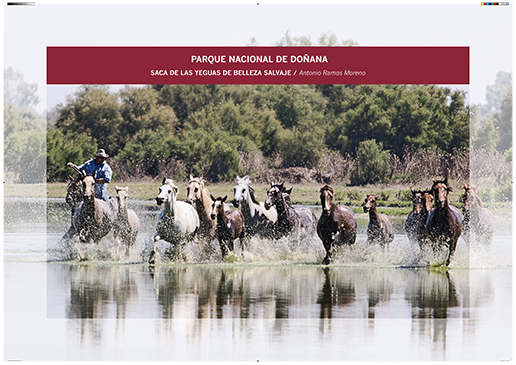 Doñana. Saca de las yeguas de belleza salvaje / Antonio Ramos Moreno
Doñana. Saca de las yeguas de belleza salvaje / Antonio Ramos Moreno
 Garajonay. Coloso / Marcos Felipe García
Garajonay. Coloso / Marcos Felipe García
 Garajonay. Etéreo / Marcos Felipe García
Garajonay. Etéreo / Marcos Felipe García
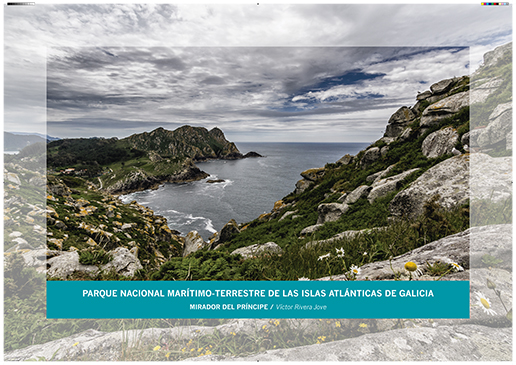 Islas Atlánticas de Galicia. Mirador del príncipe / Víctor Rivera Jove
Islas Atlánticas de Galicia. Mirador del príncipe / Víctor Rivera Jove
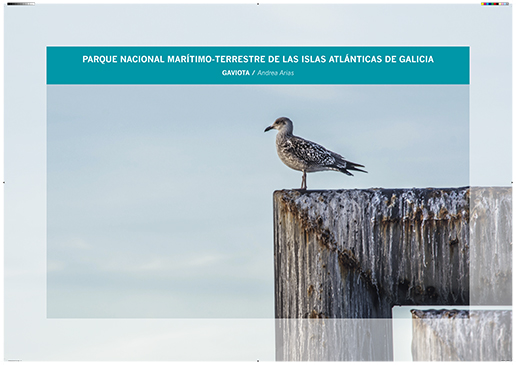 Islas Atlánticas de Galicia. Gaviota / Andrea Arias
Islas Atlánticas de Galicia. Gaviota / Andrea Arias
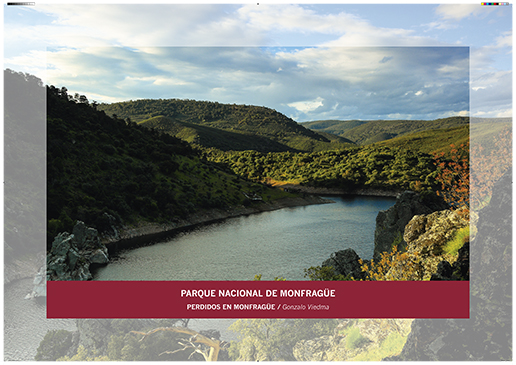 Monfragüe. Perdidos en Monfragüe / Gonzalo Viedma
Monfragüe. Perdidos en Monfragüe / Gonzalo Viedma
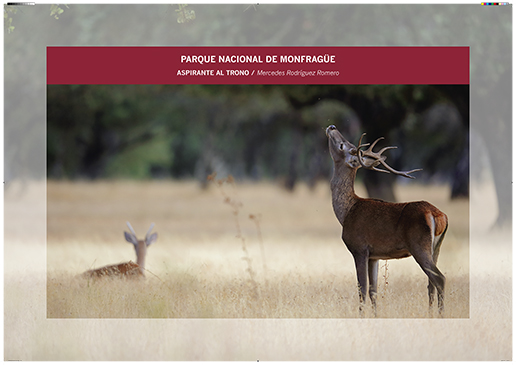 Monfragüe. Aspirante al trono / Mercedes Rodríguez Romero
Monfragüe. Aspirante al trono / Mercedes Rodríguez Romero
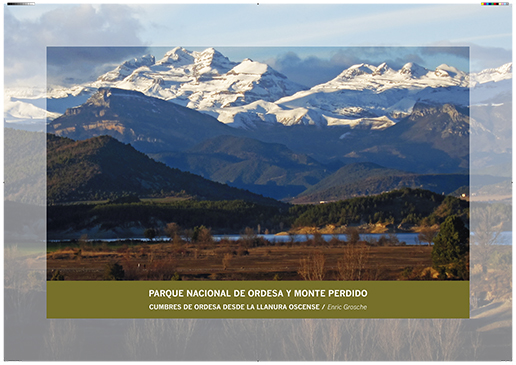 Ordesa y Monte Perdido. Cumbres de Ordesa desde la llanura oscense / Enric Grosche
Ordesa y Monte Perdido. Cumbres de Ordesa desde la llanura oscense / Enric Grosche
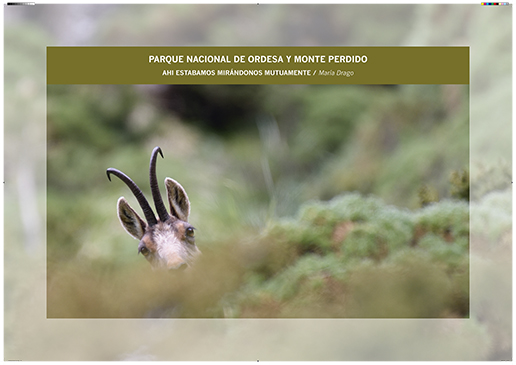 Ordesa y Monte Perdido. Ahí estábamos mirándonos mutuamente / María Drago
Ordesa y Monte Perdido. Ahí estábamos mirándonos mutuamente / María Drago
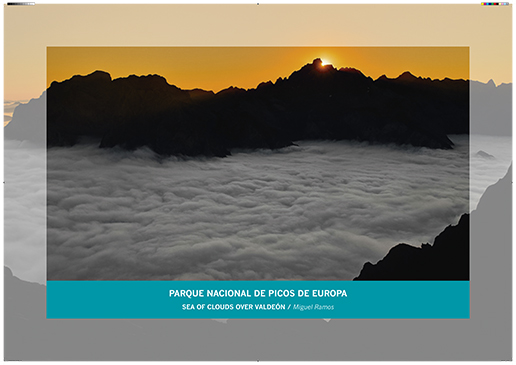 Picos de Europa. Sea of clouds over Valdeón / Miguel Ramos
Picos de Europa. Sea of clouds over Valdeón / Miguel Ramos
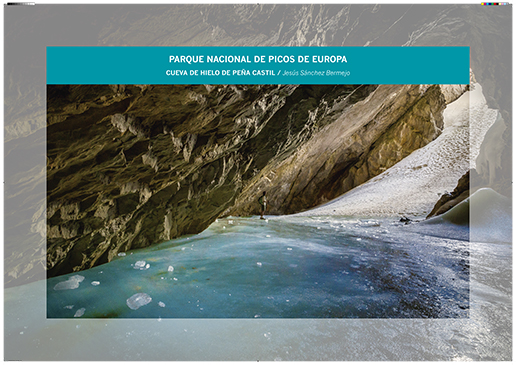 Picos de Europa. Cueva de hielo de Peña Castil / Jesús Sánchez Bermejo
Picos de Europa. Cueva de hielo de Peña Castil / Jesús Sánchez Bermejo
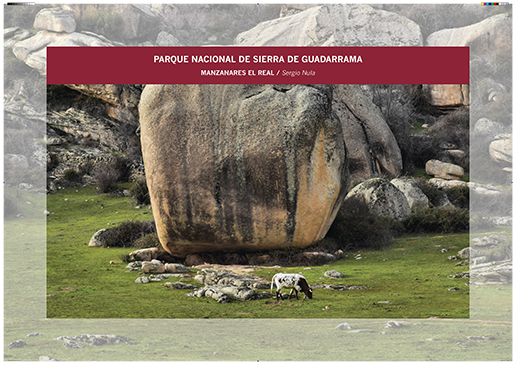 Sierra de Guadarrama. Manzanares el Real / Sergio Nula
Sierra de Guadarrama. Manzanares el Real / Sergio Nula
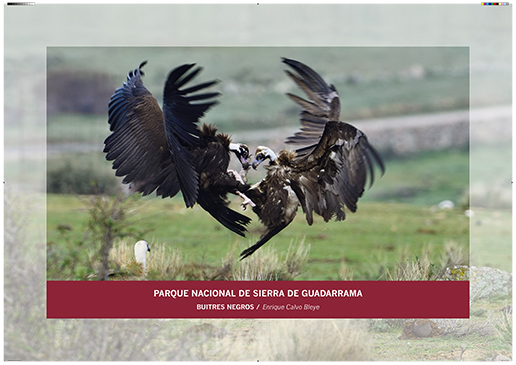 Sierra de Guadarrama. Buitres negros / Enrique Calvo Bleye
Sierra de Guadarrama. Buitres negros / Enrique Calvo Bleye
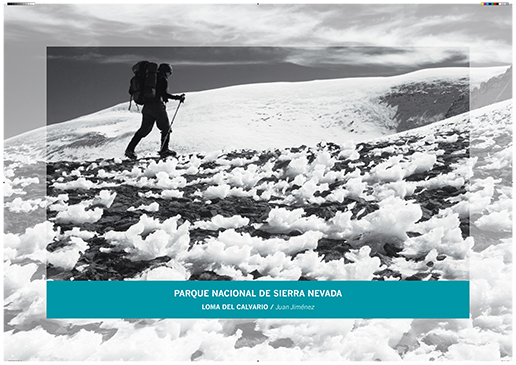 Sierra Nevada. Loma del Calvario / Juan Jiménez
Sierra Nevada. Loma del Calvario / Juan Jiménez
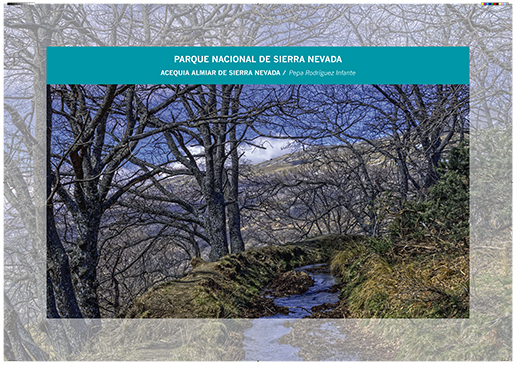 Sierra Nevada. Acequia almiar de Sierra Nevada / Pepa Rodríguez Infante
Sierra Nevada. Acequia almiar de Sierra Nevada / Pepa Rodríguez Infante
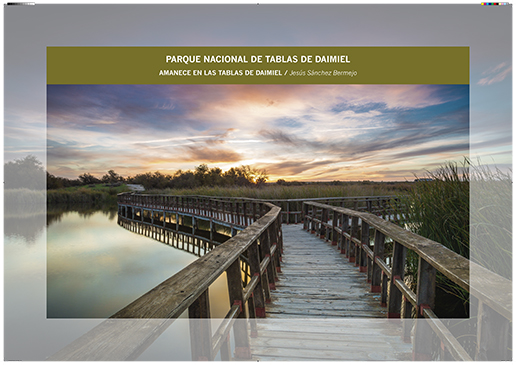 Tablas de Daimiel. Amanece en las Tablas de Daimiel / Jesús Sánchez Bermejo
Tablas de Daimiel. Amanece en las Tablas de Daimiel / Jesús Sánchez Bermejo
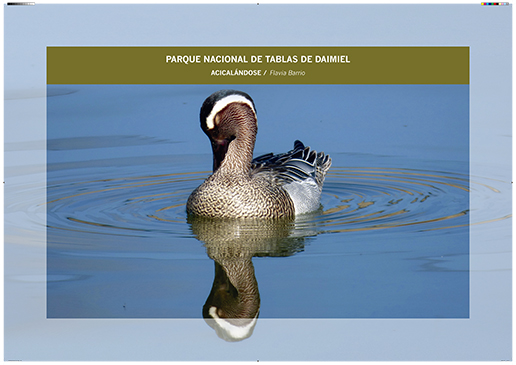 Tablas de Daimiel. Acicalándose / Flavia Barrio
Tablas de Daimiel. Acicalándose / Flavia Barrio
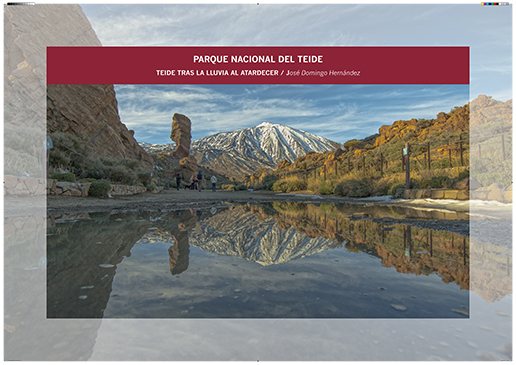 Teide. Teide tras la lluvia al atardecer / José Domingo Hernández
Teide. Teide tras la lluvia al atardecer / José Domingo Hernández
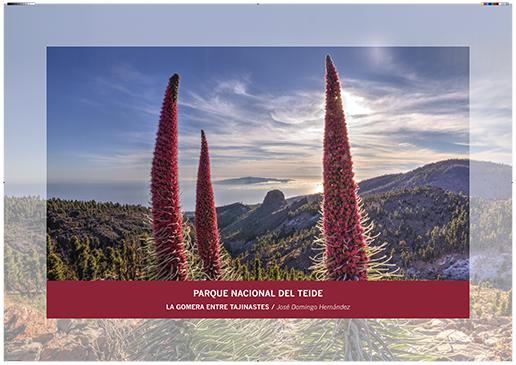 Teide. La Gomera entre tajinastes / José Domingo Hernández
Teide. La Gomera entre tajinastes / José Domingo Hernández
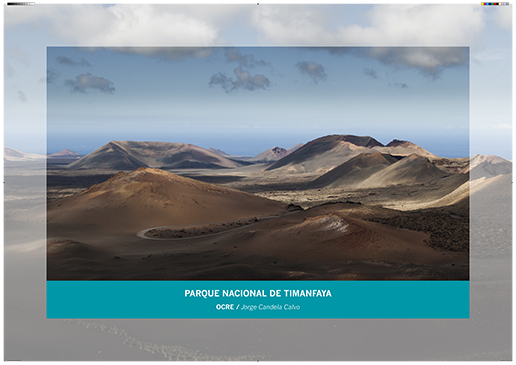 Timanfaya. Ocre / Jorge Candela Calvo
Timanfaya. Ocre / Jorge Candela Calvo
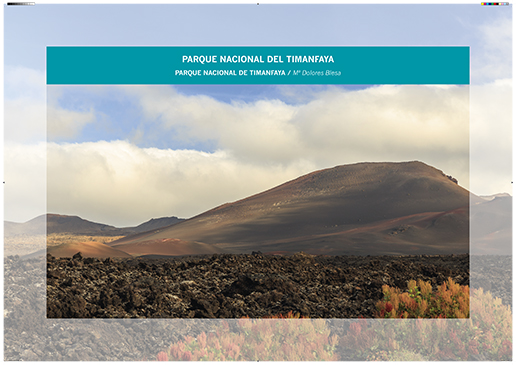 Timanfaya. Parque Nacional de Timanfaya / Mª Dolores Blesa
Timanfaya. Parque Nacional de Timanfaya / Mª Dolores Blesa
This page provides information on cookies we use: We use our own and third-party cookies to keep your session active, personalise your experience, and collect anonymous statistics about how you use this website. You can choose to accept all cookies or select which types you'd like to allow. To learn more about the cookies we use, read our Cookies Policy.
We use two types of cookies on this site. First, there are Functional Cookies, which are essential for the website to work properly. They store session data to make your experience smoother and more convenient. On the other hand, Analytical Cookies collect information about how you use the portal, without personal data, helping us provide a better and more tailored service.
Introduction to the Use of Cookies on the MITECO.gob.es Website
Cookies are small files that are stored on your device when you visit a webpage. They are essential tools that help provide many of the services available on the information society. Among other things, cookies allow a webpage to store and retrieve information about a user's browsing habits or their device. Based on this information, they can be used to recognise the user and enhance the service provided.
Types of Cookies
Depending on the entity that manages the domain from which the cookies are sent and processes the data, there are two types of cookies: first-party cookies and third-party cookies.
There is also a second classification based on how long the cookies remain stored in the user's browser: session cookies and persistent cookies.
Finally, cookies can also be classified into five types based on the purpose for which the data is processed: technical cookies, personalisation cookies, analytics cookies, advertising cookies, and behavioural advertising cookies.
For more information on this, you can refer to the Guide on the use of cookies from the Spanish Data Protection Agency.
Cookies used on the website
The web portal of the Ministry for Ecological Transition and the Demographic Challenge uses Adobe Analytics, an analytics tool that helps website and application owners understand how visitors interact with their content. Adobe Analytics uses a small number of cookies to collect data and generate usage statistics for websites. This information is sent anonymously and is not shared with third parties under any circumstances. You can choose to accept or reject these cookies, as they do not affect the portal’s functionality. However, they help provide valuable information that allows us to offer a better and more tailored service. For more information about Adobe Analytics cookies and privacy, please refer to the following links:
Additionally, pages featuring content from social network X will only set cookies if the user is logged into the X site. For more details on these cookies, please refer to the following link: Privacy on Social Network X
Finally, a technical cookie named MITECO-compliance is stored, which is a first-party, technical, and session-based cookie. It manages user consent for the use of cookies on the website, remembering which users have accepted them and which have not, ensuring that those who have accepted are not shown cookie consent messages at the top of the page. This cookie is essential for the proper functioning of the portal.
Cookies Policy Acceptance / Rejection
The Ministry for Ecological Transition and the Demographic Challenge gives you the option to accept or reject cookies that are not essential for the portal's operation. Upon accessing the portal, a message will be displayed in the centre of the page with information about the cookie policy and the following options:
· Firefox
· Chrome
· Safari



